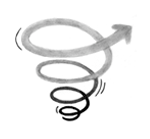 Unlike other treatment professionals, Canadian physician and social critic Gabor Maté disagrees with the current biomedical, genetic model of addiction. He insists that addictive patterns of behavior are rooted in the alienation and emotional suffering that are inseparable from Western capitalist cultures, which (by favoring striving and acquiring over noticing and caring for one another), end up shortchanging — and too often traumatizing — children and families.
Unlike other treatment professionals, Canadian physician and social critic Gabor Maté disagrees with the current biomedical, genetic model of addiction. He insists that addictive patterns of behavior are rooted in the alienation and emotional suffering that are inseparable from Western capitalist cultures, which (by favoring striving and acquiring over noticing and caring for one another), end up shortchanging — and too often traumatizing — children and families.
The Five Stages of Change

The Five Stages of Change model of behavior, originally developed in the 1970s to better understand how smokers might give up their addiction to cigarettes (Prochaska & DiClemente*), is based on the assumption that behavioral change does not take place in one step or at one time, but is rather a process involving progress through a series of distinct, predictable stages.
Four Behaviors to Combat Depression (A. Korb)
 In The Upward Spiral (New Harbinger Publications, 2015), UCLA neuroscientist Alex Korb demystifies the intricate brain processes that cause depression and offers a practical and effective approach to getting better. Based on the latest research in neuroscience, he offers multiple tips for rewiring the brain, altering its chemistry, and in so doing, creating an upward spiral towards a happier, healthier life.
In The Upward Spiral (New Harbinger Publications, 2015), UCLA neuroscientist Alex Korb demystifies the intricate brain processes that cause depression and offers a practical and effective approach to getting better. Based on the latest research in neuroscience, he offers multiple tips for rewiring the brain, altering its chemistry, and in so doing, creating an upward spiral towards a happier, healthier life.
Tips for New Grandparents (M. Haiken)
 The following pointers are abridged from a lovely online piece by Melanie Haiken, writer, editor, and former Executive Editor at BabyCenter.com. She advises new grandparents on how to handle their new role to ensure ongoing smooth relationships.
The following pointers are abridged from a lovely online piece by Melanie Haiken, writer, editor, and former Executive Editor at BabyCenter.com. She advises new grandparents on how to handle their new role to ensure ongoing smooth relationships.
At the core of her wise advice is a respect for boundaries: As much as you love this new infant, you are not the parent.
Persuasion and the Emotions (T. Chamorro-Premuzic)
In a recent article in the Harvard Business Review (Persuasion Depends Mostly on the Audience, 6.2.15), Tomas Chamorro-Premuzic, Professor of Business Psychology at University College London and a faculty member at Columbia University, explores how persuasion is emotional first and rational second. Effective persuasion, he tells us, highlights the irrationality of human thinking; “we may be living in a data-driven world, but that does not make people more logical.”
Recognizing an Abusive Relationship
 Domestic violence affects people from every racial, cultural, religious and socio-economic backgrounds, and of every sexual orientation. A leading cause of injury for American women between the ages of 15 and 54, it takes place against women of every age. It is easy and natural to ignore signs of domestic violence.
Domestic violence affects people from every racial, cultural, religious and socio-economic backgrounds, and of every sexual orientation. A leading cause of injury for American women between the ages of 15 and 54, it takes place against women of every age. It is easy and natural to ignore signs of domestic violence.
Key to Success: Trust Yourself (Diane von Furstenberg)
 In New York Times column Corner Office (05.03.15), Adam Bryant talks with top executives about the challenges of leading and managing. In an interview with fashion designer Diane von Furstenberg, a central theme running through many of her responses is the notion of trusting oneself.
In New York Times column Corner Office (05.03.15), Adam Bryant talks with top executives about the challenges of leading and managing. In an interview with fashion designer Diane von Furstenberg, a central theme running through many of her responses is the notion of trusting oneself.
I loved her definition of what it means to be relationship with oneself. The following are edited selections of her words.
Rethinking New Year’s Resolutions (T. Parker-Pope)

I appreciated New York Times blog-writer Tara Parker-Pope’s suggestion to replace New Year resolutions with mission statements. This posting is abridged from her longer posting, Creating a New Mission Statement (1.5.2015).
